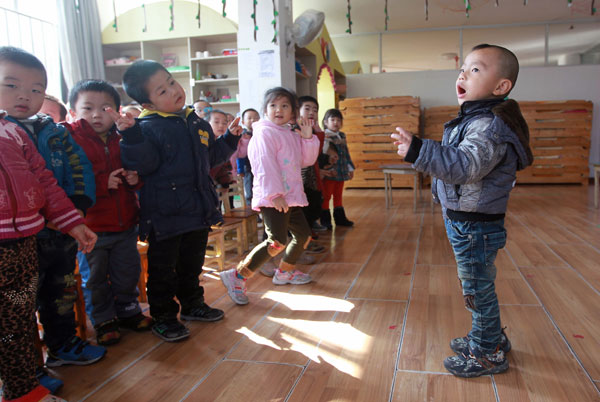The 'left-behind' generation
Updated: 2012-12-26 08:39
By He Na and Hu Meidong (China Daily)
|
||||||||
'Greater care, attention'
Olsen's case is far from unique, according to Lin Rufeng, a teacher at Guantou Overseas Chinese kindergarten. Even kindergarten kids aged 4 or 5 will say "computer" when people ask about their parents.
"They have a wealthy life compared with the local kids. Some of their clothes and toys are better than those of kids living in cities, but they are short of their parents' love," she said.
The children often display a special interest in younger, rather than older, people, and have a marked attachment to teachers, compared with kids that live with their parents. They are very easily satisfied; a simple hug makes them so happy, according to the teacher.
"So, in addition to teaching, irrespective of whether we are single or married, we try to behave like mothers and show these kids greater care and more attention," she said.
Along with the extra care, classes are also designed to take the kids' situation into account.
 |
|
Children at Guantou Overseas Chinese Kindergarten. They all hold foreign passports. Photo by Cui Meng / China Daily |
"We don't have English classes, because many parents living abroad say it's better for the kids to learn English overseas from the very beginning. Instead, we have started classes intended to foster an ability for independent living and helping each other," said the kindergarten president Lin Xiuzhu.
"Chinese language and culture is the other major subject we put special effort into. Although the kids hold foreign nationalities, learning about Chinese culture will help them trace their roots when they grow up," she said.
"Every time kids leave, we feel sad for several days. But to help them develop, I agree with sending them back to their parents as early as possible. That's because the grandparents usually just look after the kids' health, rather than fostering good habits," she added.
Her opinion was shared by Xin Ziqiang, vice-president of the School of Social Development at the Central University of Finance and Economics.
"Grandparents are less connected with current social trends and can't form the same sort of attachments as those between children and their parents. People who lacked parental support during childhood are vulnerable. They are likely to be less confident and more introverted when they reach adulthood. Kids without parental care have fewer chances to participate in activities with their peers and that can result in poor social-communication abilities," he said.
Xiong Bingqi, deputy director of the 21st Century Education Research Institute in Beijing, also attached great importance to parental interaction. "Preschool education is really about parents educating their kids. Without the parents' involvement, this early education means nothing. Although these kids are never short of money, they are still 'left-behind', just like the kids of migrant workers. Children who don't see their parents for an extended period are naturally short of family love, and no matter how hard they try, the grandparents simply can't compensate for this," he said.
"The best way to solve the problem is to send the children back to their parents as soon as possible, but if that can't be done, the parents must arrange as many phone calls and video chats as possible so the kids know their parents' love and affection are more valuable than expensive clothes and toys," he said.
Yang Wanli and Peng Yining contributed to this story.
Contact the reporter at hena@chinadaily.com.cn

 Relief reaches isolated village
Relief reaches isolated village
 Rainfall poses new threats to quake-hit region
Rainfall poses new threats to quake-hit region
 Funerals begin for Boston bombing victims
Funerals begin for Boston bombing victims
 Quake takeaway from China's Air Force
Quake takeaway from China's Air Force
 Obama celebrates young inventors at science fair
Obama celebrates young inventors at science fair
 Earth Day marked around the world
Earth Day marked around the world
 Volunteer team helping students find sense of normalcy
Volunteer team helping students find sense of normalcy
 Ethnic groups quick to join rescue efforts
Ethnic groups quick to join rescue efforts
Most Viewed
Editor's Picks

|

|

|

|

|

|
Today's Top News
Health new priority for quake zone
Xi meets US top military officer
Japan's boats driven out of Diaoyu
China mulls online shopping legislation
Bird flu death toll rises to 22
Putin appoints new ambassador to China
Japanese ships blocked from Diaoyu Islands
Inspired by Guan, more Chinese pick up golf
US Weekly

|

|






